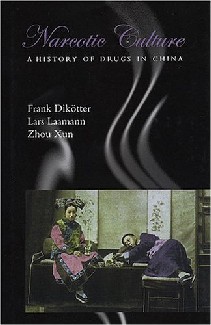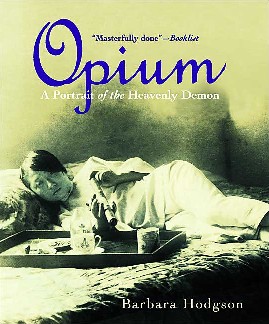DRCNet
Book
Review:
"Narcotic
Culture:
A
History
of
Drugs
in
China"
by
Frank
Dikotter,
Lars
Laaman
and
Zhou
Xun
(Oxford
University
Press,
$35.00
HB)
and
"Opium:
A
Portrait
of
the
Heavenly
Demon"
by
Barbara
Hodgson
(Greystone
Press,
$14.95
PB)
10/15/04
We all know the story of opium in China: how greedy British traders forced the fruit of the poppy down China's throat and enslaved a nation. It is a quintessential tale of imperialism, a narrative that served as a rallying cry for moralist American missionaries and Chinese nationalists alike. But according to Frank Dikotter and his co-authors in "Narcotic Culture," the accepted wisdom about opium in China is fiction.
Contrary to the received wisdom, says Dikotter, China had a long and relatively healthy relationship with opium, one that dates back centuries before the appearance of the foreign devils bearing shiploads of Indian opium toward Chinese shores. The drug was used widely -- universally, if ritual ceremonial use is included -- with few ill effects to relieve pain and mask the symptoms of physical ailments for which contemporary medicine had no cure. In fact, says Dikotter, China had evolved an "opium culture" in which the use of the drug was tolerated and took place within constraints that prevented excessive use. "Narcotic Culture" is a myth-buster, debunking long-held assumptions and quasi-racist stereotypes as it proceeds. In just one example, Dikotter examines the portrayal of opium smokers as emaciated wretches, their bodies wasted away from years of chasing the dragon. There are famous photos purporting to depict just such people, with sunken chests and ribs showing. There were indeed opium smokers in poor health, Dikotter concedes, but, like the mythical crack babies of late 20th Century America, the "opium-ravaged" subjects of those photos are artifacts not of the pharmacological properties of the poppy but of extreme poverty. For every portrayal of poor, emaciated opium smokers, there is a contrasting portrait of sleek, healthy, well-off aficionados of the pipe. But the realities of Chinese opium use fit neither the nationalist agenda of Chinese reformers, who sought an imperialist scapegoat to explain their country's subjection, nor the moral imperatives of Western missionaries, who viewed the poppy as the devil's hand maiden. Driven by these twin imperatives, Chinese opium policy shifted from tolerance to persecution. By the early 20th Century, the quiet pleasures of the opium den gave way to a carnival of cruelty, with users imprisoned, executed, and used as guinea pigs in bizarre and often painful "drug treatment" experiments. Ironically -- but not surprisingly to anyone who follows the inexorable logic of prohibition -- the efforts to suppress the opium habit led to the introduction of its chemical compounds, morphine and later heroin, and a move from smoking with a pipe to injecting with a needle. Also unsurprisingly, both morphine and heroin were eagerly embraced early on by doctors and preachers alike as the "cure" for opium addiction. Reading "Narcotic Culture," one is struck first by the senseless inhumanity of drug prohibition Chinese-style, with its heavy-handed repression and its "treatments" right out of the cabinet of Dr. Caligari. But that was a century ago, at the dawn of the modern prohibitionist era. The moralists and would-be saviors of those addicted wretches can perhaps be forgiven for their ignorance. What is depressing is to ponder how similar is the discourse of contemporary prohibition. Will observers a hundred years for now look back and condemn us for our barbarism? Probably. And, thanks to people like Dikotter, we don't even have the excuse of ignorance.
A slender, elegantly wrought, and beautifully produced volume, Hodgson's "Opium" is a celebration of the decadent dream world opium represented to Western eyes. For aficionados of the poppy and its culture, the photos and illustrations alone make the book a worthy addition to the library. Movie stills showing our white women falling prey to evil Orientals under the spell of the pipe reveal more about contemporary attitudes and fears than a dozen scholarly monologues. Hodgson also provides a lively text, replete with sketches of such literary and artistic figures as Thomas de Quincy, Charles Baudelaire, and Edgar Allen Poe, and their opium-influenced work. But Hodgson also swoops from the high culture of the West to its pulp fiction, where maniacal mandarins and evil poppies threaten our society, our culture, and most of all, our white women. "Narcotic Culture" is an important contribution to the emerging true history of drugs and drug prohibition and belongs on the bookshelf of every student of the topic. Hodgson's "Opium" will appeal not only to those interested in the history of opium in both East and West, but to students of Western decadence and the pull of exotic Orientalism on Western intellectual traditions. For those who know a serious opium fiend, the two books together make a very nice set.
|


